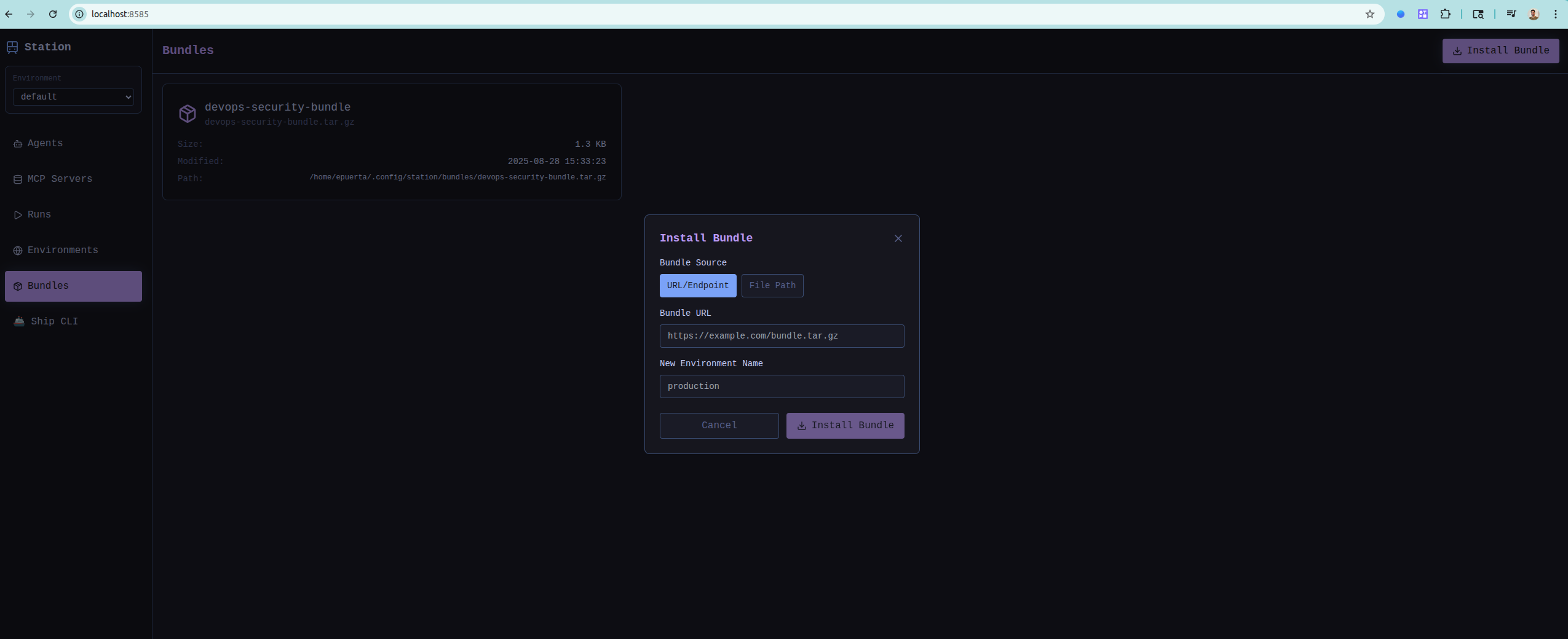Creating Bundles
Learn how to create, package, and distribute Station environment bundles that work seamlessly across different deployments and teams.
What are Station Bundles?
Station bundles are portable environment packages that contain:
- Agent definitions - Pre-configured AI agents with specialized prompts
- MCP tool configurations - Connections to security, DevOps, and development tools
- Environment settings - Ready-to-deploy configurations
Bundles enable you to share complete AI-powered workflows and quickly replicate environments across teams.
graph LR
subgraph "Bundle Creation"
Env[Station Environment] --> Bundle[Bundle.tar.gz]
Bundle --> Registry[Registry Distribution]
end
subgraph "Environment Contents"
Agents[AI Agents]
MCP[MCP Tools]
Config[Configuration Files]
end
subgraph "Installation Methods"
UI[Station UI]
API[REST API]
CLI[CLI Command]
MCP_Tools[MCP Tools]
end
Env --> Agents
Env --> MCP
Env --> Config
Registry --> UI
Registry --> API
Registry --> CLI
Registry --> MCP_Tools
UI --> NewEnv[New Environment]
API --> NewEnv
CLI --> NewEnv
MCP_Tools --> NewEnv
style Bundle fill:#e1f5fe
style Registry fill:#f3e5f5
style NewEnv fill:#e8f5e8Bundle Creation Methods
Method 1: CLI Command (Recommended)
Create a bundle from any existing environment:
# List your environments
stn environments list
# Create bundle from environment
stn bundle my-environment --output my-custom-bundle.tar.gzMethod 2: MCP Tools (For Claude Code/AI)
Use Station’s MCP integration to create bundles programmatically:
# Available via Claude Code when Station MCP is connected
create_bundle_from_environment(environmentName="my-environment", outputPath="./bundle.tar.gz")Method 3: API Integration
Create bundles via the Station CLI for CI/CD integration:
stn bundle create my-environment --output ./bundle.tar.gzSetting Up Your Environment for Bundling
1. Configure MCP Tools
Create MCP server configurations in your environment directory:
// ~/.config/station/environments/my-env/security-tools.json
{
"mcpServers": {
"ship-checkov": {
"command": "ship",
"args": ["mcp", "checkov"]
},
"ship-tflint": {
"command": "ship",
"args": ["mcp", "tflint"]
}
}
}2. Create Agent Definitions
Add specialized agents to your environment:
# Create agents through the UI or CLI
stn agent create --name "Security Scanner" \
--description "Scans repositories for security vulnerabilities" \
--environment my-env \
--tools "__checkov_scan_directory,__checkov_scan_file,__checkov_scan_secrets"3. Test Your Environment
Verify everything works before bundling:
# Check MCP tools are loaded
stn tools list --environment my-env
# Test agent execution
stn agent run "Security Scanner" "Scan the current directory for vulnerabilities"4. Create the Bundle
# Bundle your tested environment
stn bundle my-env --output production-security-bundle.tar.gz
# Verify bundle contents
tar -tzf production-security-bundle.tar.gzBundle Structure
A Station bundle contains these files:
agents/
├── Security Scanner.prompt # Agent definition files
├── Terraform Auditor.prompt
security-tools.json # MCP server configurations
other-tools.json # Additional MCP configsInstalling Bundles
Via Station UI

- Navigate to Bundles section
- Paste bundle URL or upload file
- Select target environment name
- Click “Install Bundle”
Via CLI
# Install from local file
stn bundle install ./my-bundle.tar.gz new-environment
# Install from URL (e.g., GitHub release)
stn bundle install https://github.com/user/repo/releases/download/v1.0/bundle.tar.gz productionReal-World Example: DevOps Security Bundle
Here’s how to create a production-ready security bundle:
1. Set up the environment
# Initialize environment with security tools
stn load https://github.com/shiptools/ship-checkov
stn load https://github.com/shiptools/ship-tflint
# Create security agents
stn agent create --name "Security Scanner" \
--prompt "Scan repositories for security vulnerabilities using checkov tools" \
--tools "__checkov_scan_directory,__checkov_scan_file,__checkov_scan_secrets"
stn agent create --name "Terraform Auditor" \
--prompt "Analyze Terraform files for best practices using tflint" \
--tools "__tflint_check,__tflint_init"2. Test in CI/CD
# .github/workflows/security-scan.yml
- name: Run Security Analysis
run: |
docker run -v $(pwd):/workspace epuerta18/station-default:latest \
stn agent run "Security Scanner" "Scan /workspace for security issues"3. Create and publish bundle
# Create bundle
stn bundle security-environment --output devops-security-bundle.tar.gz
# Test installation in fresh environment
stn bundle install ./devops-security-bundle.tar.gz test-installBundle Best Practices
- Environment Isolation - Test bundles in clean environments before publishing
- Tool Dependencies - Ensure all required tools are available in target environments
- Agent Validation - Verify agents work with their assigned tools
- Documentation - Include usage examples and tool requirements
- Version Control - Tag releases and maintain changelog
- Security Review - Audit tools and permissions before sharing
CI/CD Integration
Automate bundle creation and testing in your workflows:
graph TB
subgraph "CI/CD Pipeline"
Push[Code Push] --> Build[Build Station Environment]
Build --> Bundle[Create Bundle]
Bundle --> Test[Test Bundle Installation]
Test --> Deploy[Deploy to Registry]
end
subgraph "Station Container"
Agents[Security Agents]
Tools[Ship CLI Tools]
Docker[Docker Socket]
end
subgraph "Security Analysis"
Checkov[Checkov Scan]
TFLint[TFLint Validation]
Secrets[Secret Detection]
end
Build --> Agents
Build --> Tools
Build --> Docker
Agents --> Checkov
Agents --> TFLint
Agents --> Secrets
Checkov --> Results[Analysis Results]
TFLint --> Results
Secrets --> Results
Results --> PRComment[PR Comment]
Results --> Artifacts[Build Artifacts]
style Build fill:#e1f5fe
style Bundle fill:#f3e5f5
style Results fill:#e8f5e8name: Build and Test Bundle
on:
push:
paths: ['environments/production/**']
jobs:
bundle:
runs-on: ubuntu-latest
steps:
- uses: actions/checkout@v4
- name: Create Bundle
run: |
# Use Station CLI to create bundle from environment
stn bundle create production --output ./production-bundle.tar.gz
- name: Test Bundle Installation
run: |
docker run -v $(pwd):/workspace epuerta18/station-default:latest \
stn bundle install /workspace/production-bundle.tar.gz ci-test
- name: Upload Bundle Artifact
uses: actions/upload-artifact@v4
with:
name: production-bundle
path: production-bundle.tar.gzNext Steps
- Publishing Bundles - Share bundles via registry
- Bundle Registry - Browse community bundles
- CI/CD Integration - Automate with GitHub Actions